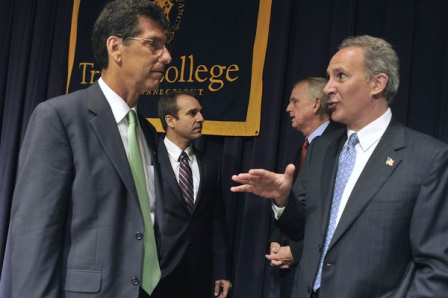As previously discussed, it is possible their deficits already got high enough and the euro low enough to support very modest growth when market forces intervened to stop further fiscal expansion.
One problem now is proactive cuts can set them back if a combination of private sector credit and exports doesn’t expand at the same time.
And expanding exports remains problematic as that would tend to strengthen the currency to the point where net exports remain relatively low, and there is nothing they can do to keep the euro down should that happen.
Another problem is the market forces that are working to limit their fiscal expansion will continue to hamper their ability to fund themselves, especially with continuing talk of ‘restructuring’ which, functionally, is a form of default.
I’ve read the ECB is now buying about 10 billion euro/week of national govt bonds in the secondary markets and ‘learning and demonstrating’ that it is not inflationary, doesn’t cause a currency collapse, and poses no operational risk to the ECB as some feared it might. As they all become ‘comfortable’ with this look for market forces to ‘force’ them to expand the buying geometrically as happened with their funding of their banking system, where much of the ‘risk’ is now at the ECB as they accept collateral for funding from their member banks that no one else will.
Operationally the ECB can fund the whole shooting match. And if they can address the moral hazard the usual way via the growth and stability pact, this time with the leverage of being able to threaten to cut off ECB funding to punish non compliance.
This ‘solution’ of the ECB buying national govt debt in the secondary markets is conceptually/functionally nearly identical to my proposal of per capita distributions to the national govts by the ECB. The difference is my proposal would not have ‘rewarded bad behavior’ as theirs does, but that’s a relatively minor consideration for them at the moment, and if they continue doing what they are doing, they have ‘saved the euro,’ even though having the ECB fund all the banks and national govts wasn’t their original idea of how it all would end up.
European Industrial Orders Increase for Third Month
Trichet Says Current Situation Requires ‘Credible Measures’
ECB’s Trichet Says Italian Budget Cuts Go in ‘Right Direction’
German debt agency asked to issue bonds
Schäuble defends German austerity
German Government Won’t Turn to Tax Cuts Amid Deficit Reduction
S&P’s Kraemer Sees No ‘Serious Risk’ of Euro Break Up
Merkel Defends Spending Cuts, Gets Backing From Trichet
Germany Sees Jobless Numbers at Under 3 Million
French Consumer Spending Gains on Signs Job Market Is Improving
French Economy to Expand 1.4% This Year on Exports, Insee Says
Zapatero Says Not Cutting Deficit Would Raise Interest Costs


